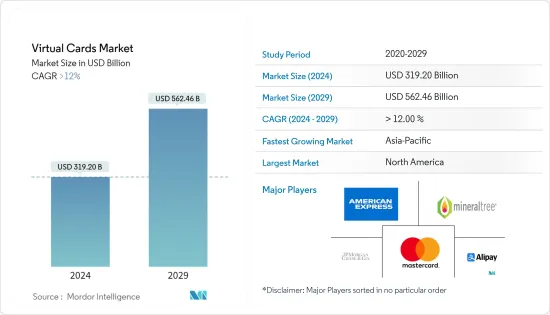PUBLISHER: Mordor Intelligence | PRODUCT CODE: 1523381

PUBLISHER: Mordor Intelligence | PRODUCT CODE: 1523381
Virtual Cards - Market Share Analysis, Industry Trends & Statistics, Growth Forecasts (2024 - 2029)
The Virtual Cards Market size is estimated at USD 319.20 billion in 2024, and is expected to reach USD 562.46 billion by 2029, growing at a CAGR of greater than 12% during the forecast period (2024-2029).

Over the upcoming years, there will be a notable increase in the market for virtual cards. Due to reasons like the rising use of digital platforms and online payment methods, the industry will rise rapidly. The growing trend of virtual cards is because they save the trouble and cost of handling real cards and processing paper. The epidemic has increased consumer demand for contactless payment options, and the industry is seeing a rapid influx of new contactless spending options. A virtual prepaid card, apart from phone orders and internet transactions, is a digital payment instrument that functions similarly to an actual prepaid card.
Tokenization is used to create credentials randomly, and the cards have integrated financial controls that let you fund the card for single-use or multiple-use purchases. Virtual prepaid cards enhance the payment experience by making online shopping safer, easier, and more capable.
Virtual Cards Market Trends
Increasing Online Transactions is Augmenting the Virtual Cards Market in Asia-Pacific
In Asia-Pacific, cashless payment methods rapidly evolve with ground-breaking innovations such as mobile wallets, peer-to-peer (P2P) mobile payments, real-time payments, and cryptocurrencies. Due to enhanced broadband connectivity, increasing mobile commerce in China, Japan, and India, and new technologies such as virtual reality, artificial intelligence, and rapid digitization, billions of people have started embracing contactless payments in developed and emerging countries. Besides, surging e-commerce businesses, digital remittances, digital business payments, and mobile B2B payments are boosting the non-cash transaction ecosystem. In addition, as the global usage of smartphones, online payment modes, and online shopping increases due to urbanization, the need for virtual cards will likely rise.
Increasing adoption of Virtual Cards for B2B Payments
The rise of virtual cards for B2B payments has been remarkable. Businesses increasingly recognize the benefits of using virtual cards for their payment needs. Virtual cards offer advanced security features that protect businesses from fraud and unauthorized transactions. With unique card numbers generated for each transaction or vendor, companies can minimize the risk of data breaches and fraudulent activities. Virtual cards are streamlining the entire payment process for B2B transactions. They are eliminating the need for manual paperwork, checks, and wire transfers, reducing administrative burdens and saving time. Virtual cards are seamlessly integrated with existing accounting and payment systems, making the adoption process smoother for businesses.
Virtual Cards Industry Overview
The virtual card market is relatively fragmented. Major multinational companies involved in the virtual card market are included in the research. The market is concentrated in terms of share. Nonetheless, mid-size to smaller businesses are expanding their market presence by landing new contracts and breaking into untapped sectors thanks to product innovation and technology improvement. Some major players in the Virtual Cards market are American Express Company, JPMorgan Chase & Co., Mastercard Incorporated, and many more.
Additional Benefits:
- The market estimate (ME) sheet in Excel format
- 3 months of analyst support
TABLE OF CONTENTS
1 INTRODUCTION
- 1.1 Study Assumptions and Market Definition
- 1.2 Scope of the Study
2 RESEARCH METHODOLOGY
3 EXECUTIVE SUMMARY
4 MARKET DYNAMICS AND INSIGHTS
- 4.1 Market Overview
- 4.2 Market Drivers
- 4.2.1 Digital Transformation is Driving the Market
- 4.3 Market Restraints
- 4.3.1 Connectivity and Technical Issues is Restraining the Market
- 4.4 Market Opportunities
- 4.4.1 Collaborations between Virtual Card Providers, Fintech Companies, and Financial Institutions can Unlock New Opportunity
- 4.5 Industry Attractiveness - Porter's Five Forces Analysis
- 4.5.1 Bargaining Power of Suppliers
- 4.5.2 Bargaining Power of Buyers
- 4.5.3 Threat of New Entrants
- 4.5.4 Threat of Substitutes
- 4.5.5 Intensity of Competitive Rivalry
- 4.6 Insights on Impact of Technology and Innovation in the Market
- 4.7 Insights on Performance of Virtual Card Providers Globally
- 4.8 Impact of COVID-19 on the Market
5 MARKET SEGMENTATION
- 5.1 Product Type
- 5.1.1 B2B Virtual Cards
- 5.1.2 B2C Remote Payment Virtual Cards
- 5.1.3 B2C POS Virtual Cards
- 5.2 End User
- 5.2.1 Consumer Use
- 5.2.2 Business Use
- 5.3 By Geography
- 5.3.1 North America
- 5.3.1.1 United States
- 5.3.1.2 Canada
- 5.3.1.3 Rest of North America
- 5.3.2 South America
- 5.3.2.1 Brazil
- 5.3.2.2 Peru
- 5.3.2.3 Rest of South America
- 5.3.3 Europe
- 5.3.3.1 United Kingdom
- 5.3.3.2 Germany
- 5.3.3.3 Rest of Europe
- 5.3.4 Asia-Pacific
- 5.3.4.1 India
- 5.3.4.2 Japan
- 5.3.4.3 Rest of Asia-Pacific
- 5.3.5 Middle East & Africa
- 5.3.5.1 Saudi Arabia
- 5.3.5.2 United Arab Emirates
- 5.3.5.3 Rest of Middle East & Africa
- 5.3.1 North America
6 COMPETITIVE LANDSCAPE
- 6.1 Market Concentration Overview
- 6.2 Company Profiles
- 6.2.1 American Express Company
- 6.2.2 JPMorgan Chase & Co.
- 6.2.3 Mastercard Incorporated
- 6.2.4 Alipay.com Co Ltd.
- 6.2.5 MineralTree Inc.
- 6.2.6 Skrill USA, Inc.
- 6.2.7 Fraedom Holdings Limited
- 6.2.8 Abine, Inc.
- 6.2.9 Billtrust, Inc.
- 6.2.10 ACI Worldwide Inc.*
7 MARKET FUTURE TRENDS
8 DISCLAIMER AND ABOUT US




